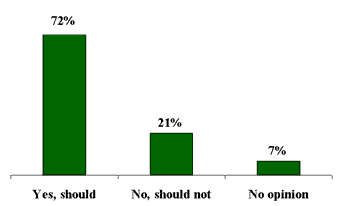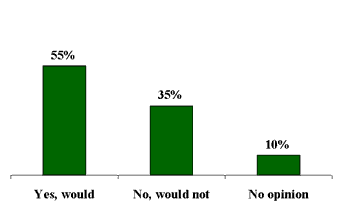GALLUP NEWS SERVICE
PRINCETON, NJ -- A recent Gallup Poll suggests that the Bush administration's current proposal for administering the newly manufactured smallpox vaccine to the public falls short of what most Americans would accept. The administration has already announced that it soon plans to offer smallpox inoculations to 1 million military, healthcare, and emergency-response personnel. The vaccine will eventually be made available to all Americans, although the government probably would not encourage everyone to get it. By contrast, a strong majority of Americans would support the idea of a government-initiated program that offers a smallpox vaccine to all Americans. A much slimmer majority, however, says they personally would opt to be vaccinated if it were available. The latest poll also finds that the number of Americans identifying bioterrorism, anthrax, or smallpox as the nation's "most urgent health problem" has diminished sharply since last year.
Americans Support Government Program to Vaccinate Americans Against Smallpox
Gallup's Nov. 11-14 poll focused on health issues and asked Americans whether the U.S. government should initiate a program that offers a smallpox vaccine to all Americans. The results show that 72% of Americans say the government should offer such a program, while 21% oppose such a program and 7% have no opinion.
| Do you think the United States government should -- or should not -- initiate a program that offers a smallpox vaccine to all Americans? |
 |
| Nov. 11-14, 2002 |
Slightly More Than Half of the Public Would Get Smallpox Vaccinations
Despite widespread support for a government-sponsored smallpox vaccination program, only 55% of Americans say they, personally, would get vaccinated. Another 35% say they would not get the vaccine, while about 1 in 10 are unsure.
| Would you, personally, get a smallpox vaccine if it were available? |
 |
| Nov. 11-14, 2002 |
There are clear differences in the responses to these questions by age. Younger Americans are somewhat more likely than older Americans to support the concept of a government program to vaccinate the general public. Seventy-seven percent of adults aged 18 to 34 support a government vaccination program, compared with 70% of adults aged 35 and older.
Despite this, there are few differences by age in the percentage who would personally get a vaccine against smallpox. Fifty-four percent of 18- to 34-year-olds would get the shot if available, compared with 50% of adults aged 35 to 49 and 59% of adults aged 50 and older.
These recent Gallup questions about a government-sponsored smallpox vaccination program were asked a little more than a year after the Sept. 11. 2001, terrorist attacks and the anthrax incidents that occurred later that fall. Several poll questions about smallpox were asked around that time by other polling organizations, but in a much different fashion.
A key question in anticipating the public's reaction to making the smallpox vaccine widely available is whether Americans fully understand the vaccine's risks and benefits. Gallup simply asks respondents whether they favor or oppose the policy. Thus, respondents answer on the basis of whatever impressions they have currently formed about the vaccination.
Another approach followed by several other polling organizations last fall was to provide respondents with some basic information about the advantages and disadvantages of the vaccine, before asking respondents whether they believe it should be widely administered. This approach levels the information playing field among respondents, and helps ensure that respondents' answers relate to the real policy decision being faced. Whether it provides an accurate reflection of the public's true beliefs about wide-scale vaccination, however, is unclear.
The interesting finding, however, is that both types of questions on this topic yielded similar answers. In all polls, the percentage favoring offering the vaccine to all Americans falls between 50% and 61%.
|
|
|
Would get the vaccine |
|
Americans have not gotten smallpox vaccinations for years, but the vaccines would protect people if terrorists released smallpox into the air. The vaccine carries some serious side effects, however, and can be fatal for a small percentage who get it. If you were offered the vaccine, would you get it to protect yourself or not? |
Associated Press Poll |
61% |
|
There's a vaccine that would protect people from smallpox, but the vaccine itself can kill a small number of people who get it -- about one out of every 500,000 -- and make another one out of 150,000 seriously ill. Some people say all Americans should be vaccinated against smallpox to protect them in case terrorists spread the disease. Others say the chance that terrorists could get a hold of smallpox is too slight to justify the risk of the vaccine itself. If a smallpox vaccine became available, would you, yourself, get the shot, or not? |
ABC News (Nov. 28-Dec. 2, 2001) |
50% |
|
As you may know, a vaccine for smallpox exists but it may product negative side effects. If such a vaccine were made available to you, would you take the vaccine as a precaution against a terrorist attack using smallpox, or wouldn't you take such a vaccine? |
Harvard School of Public Health, Robert Wood Johnson Foundation (Nov. 29-Dec. 3, 2001) |
51% |
Few Americans Identify Bioterrorism, Anthrax, Smallpox as the Nation's Most Urgent Health Problem
Gallup's recent health poll also asked Americans to name "the most urgent health problem facing this country at the present time." The results show a dramatic shift over the past year. In November 2001, at the height of the anthrax cases and investigation, bioterrorism, anthrax, and smallpox topped the most urgent health problem list, with more than one in five Americans, 22%, offering these responses. The latest poll, however, finds that only 1% of Americans say bioterrorism, anthrax, or smallpox is the most urgent health problem at this time. The most urgent health problems today, according to the public, are healthcare costs, access to healthcare, and cancer.
Survey Methods
The results below are based on telephone interviews with a randomly selected national sample of 1,001 adults, aged 18 and older, conducted Nov. 11-14, 2002. For results based on this sample, one can say with 95% confidence that the maximum error attributable to sampling and other random effects is ±3 percentage points. In addition to sampling error, question wording and practical difficulties in conducting surveys can introduce error or bias into the findings of public opinion polls.
Do you think the United States government should -- or should not -- initiate a program that offers a smallpox vaccine to all Americans?
[BASED ON --526-- NATIONAL ADULTS IN FORM A]
|
|
Yes, should |
No, should not |
No opinion |
|
2002 Nov 11-14 |
72% |
21 |
7 |
Would you, personally, get a smallpox vaccine if it were available?
[BASED ON --475-- NATIONAL ADULTS IN FORM B]
|
|
Yes |
No |
No opinion |
|
2002 Nov 11-14 |
55% |
35 |
10 |
